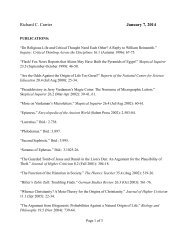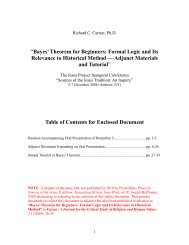Cultural History of the Lunar and Solar Eclipse in ... - Richard Carrier
Cultural History of the Lunar and Solar Eclipse in ... - Richard Carrier
Cultural History of the Lunar and Solar Eclipse in ... - Richard Carrier
You also want an ePaper? Increase the reach of your titles
YUMPU automatically turns print PDFs into web optimized ePapers that Google loves.
have spread beyond <strong>the</strong> literate elite, <strong>and</strong> as <strong>the</strong>y represent a t<strong>in</strong>y m<strong>in</strong>ority <strong>of</strong> <strong>the</strong><br />
population even with<strong>in</strong> cities, much less <strong>in</strong> <strong>the</strong> countryside, we cannot generalize <strong>in</strong> our<br />
declarations <strong>of</strong> what <strong>the</strong> ancients “knew” about <strong>the</strong> natural world. For if this example<br />
can be extended, science does not seem to have penetrated <strong>in</strong>to public lore as it has <strong>in</strong><br />
modern societies.<br />
I. Science Lessons: <strong>the</strong> Gulf Between <strong>the</strong> Learned <strong>and</strong> <strong>the</strong> Unleared<br />
Rationality is partly to be found <strong>in</strong> <strong>the</strong> belief that nature itself is rational. In o<strong>the</strong>r words,<br />
<strong>the</strong>re is a natural order which proceeds by repeatable causes that can be discovered<br />
<strong>and</strong> understood by man—a natural order, moreover, which proceeds irrespective <strong>of</strong><br />
human affairs. Educated Romans <strong>and</strong> Greeks were aware <strong>of</strong> such a pr<strong>in</strong>ciple, <strong>and</strong> it<br />
would play a significant role <strong>in</strong> <strong>the</strong>ir response to all k<strong>in</strong>ds <strong>of</strong> extraord<strong>in</strong>ary phenomena.<br />
But this was seen as a dogma that not only aids <strong>in</strong> gett<strong>in</strong>g at <strong>the</strong> truth, but that calms<br />
<strong>and</strong> civilizes <strong>the</strong> m<strong>in</strong>d. The uneducated commons not only knew substantially less than<br />
<strong>the</strong>ir educated leaders, <strong>the</strong>y also lacked enculturation <strong>in</strong>to this dogma <strong>of</strong> rationality, so<br />
that even if presented with <strong>the</strong> facts, <strong>the</strong>y would be unprepared to fully underst<strong>and</strong> <strong>the</strong>ir<br />
significance, <strong>and</strong> may even be suspicious <strong>of</strong> <strong>the</strong>m. 3 The different cultural perspectives<br />
<strong>of</strong> <strong>the</strong>se two social groups, <strong>and</strong> <strong>the</strong> <strong>in</strong>teraction between <strong>the</strong>m, is <strong>the</strong> first object <strong>of</strong> our<br />
study.<br />
It was Aristotle who first declared that wisdom was <strong>the</strong> measure <strong>of</strong> one’s knowledge <strong>of</strong><br />
<strong>the</strong> natural causes <strong>of</strong> th<strong>in</strong>gs, 4 <strong>and</strong> this assumption had been assimilated <strong>in</strong>to Roman<br />
elite culture by <strong>the</strong> first century B.C. And so we f<strong>in</strong>d Cicero stat<strong>in</strong>g unreservedly:<br />
it is necessary that whatever arises, <strong>of</strong> whatever k<strong>in</strong>d, has its cause from nature, so that<br />
even if it happens contrary to what is usual, it still cannot happen contrary to nature.<br />
Therefore, <strong>in</strong>vestigate <strong>the</strong> cause for every new <strong>and</strong> remarkable event, if you can, <strong>and</strong> if<br />
you discover none, you must still consider it certa<strong>in</strong> that noth<strong>in</strong>g can happen without a<br />
cause. 5<br />
‡<br />
He goes on to add <strong>the</strong> reason one should adopt this assumption: to do so will free you<br />
from fear, for <strong>the</strong>n noth<strong>in</strong>g will terrify you. 6 A century later, <strong>the</strong> younger Seneca repeats<br />
this sentiment: “S<strong>in</strong>ce <strong>the</strong> cause <strong>of</strong> be<strong>in</strong>g afraid is not to know, isn’t it very worthwhile to<br />
3 The novelty <strong>and</strong> difficulty <strong>of</strong> scientific reason<strong>in</strong>g has recently been argued by Alan Cromer <strong>in</strong><br />
Uncommon Sense: The Heretical Nature <strong>of</strong> Science (Oxford, 1993) <strong>and</strong> Donald Calne <strong>in</strong> With<strong>in</strong> Reason:<br />
Rationality <strong>and</strong> Human Behavior (V<strong>in</strong>tage, 1999). Both argue that an enculturation period is necessary<br />
for scientific explanations to be readily understood.<br />
4 Metaphysics, 982a.<br />
5 On Div<strong>in</strong>ation, 2.28 (60).<br />
6 cf. also Virgil, Georgics, 2.4.90-2. Although Cicero attributes this <strong>the</strong>sis to <strong>the</strong> Stoic philosopher<br />
Chrysippus, it was a view shared also by Epicureans (cf. Lucretius 1.146-8), <strong>and</strong> <strong>of</strong> course by <strong>the</strong><br />
Peripatetics, whose ideas generally descended from Aristotle.








